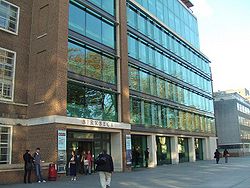Postsecularism and New Zealand in the 21st century
In 2008, the International Social Survey Programme was conducted in New Zealand by Massey University.[1] The results of this survey indicated that 72% of the population believed in the existence of God or a higher power, 15% are agnostic, and 13% are atheist (the survey had a 3% margin of error).[2] See: Irreligion in New Zealand
Jens Köhrsen), a professor for religion and economics at the Centre for Religion, Economy and Politics (ZRWP)[3], wrote:
| “ | [ Jürgen Habermas ] ...argues that a new age, the age of post-secularity, has begun. Previously vastly secularized societies, like the highly developed countries of Europe, Australia, New Zealand and Canada, would experience a new awareness of religion and attribute a new public role to religion. From now on, religion would constitute a relevant dialogue partner in the public debates of these societies (Habermas, 2008). Moreover, Habermas presents a normative argument about public religion: he recommends that post-secular societies should facilitate religious contributions to the public sphere. Religious reasoning could contribute to public debates about the ethical values of contemporaneous and future societies. Habermas believes that modern societies might find some answers to the moral questions of our time by listening to religion in public debates (Habermas, 2001, 2005, 2006, 2008). A similar position to that of Habermas is proposed by Leclerc (2001) and French sociologist Willaime (2004a, 2004b, 2005[1995]: 76-78, 2008). Willaime observes that even the highly secularized public and political sphere of France is exhibiting a new, more open attitude towards religion. The hypersecularity of France would stimulate a restructuration process of religion. According to Willaime, religion can form an important resource for public debates and be engaged in the identity construction process of individuals and collectives.[4] | ” |

Eric Kaufmann is a professor of politics at Birkbeck, University of London and author. His academic research specialty is how demographic changes affect religion/irreligion and politics.
In April 2010, Kaufmann, who is an agnostic, declared "the rate of secularisation has flattened to zero in most of Protestant Europe and France."[9] Kaufmann also declared that secularism "appears exhausted and lacking in confidence".[10]
On December 23, 2012, Kaufmann wrote:
| “ | I argue that 97% of the world's population growth is taking place in the developing world, where 95% of people are religious.
On the other hand, the secular West and East Asia has very low fertility and a rapidly aging population... In the coming decades, the developed world's demand for workers to pay its pensions and work in its service sector will soar alongside the booming supply of young people in the third world. Ergo, we can expect significant immigration to the secular West which will import religious revival on the back of ethnic change. In addition, those with religious beliefs tend to have higher birth rates than the secular population, with fundamentalists having far larger families. The epicentre of these trends will be in immigration gateway cities like New York (a third white), Amsterdam (half Dutch), Los Angeles (28% white), and London, 45% white British.[11] [12] |
” |
For additional information, please see: 21st century New Zealand: Irreligion, religion and religious immigrants
Prime Minister Jacinda Adern gifts her Bible to movement at a Rātana church
In 2018, a New Zealand news website declared: "Prime Minister Jacinda Ardern speaks during centenary celebrations at Rātana Church in November. She gifted her Bible to the movement, saying it was a symbol of her promise to lead be a government that was kind and compassionate."[13]
See also
References
- ↑ "Religion In New Zealand: International Social Survey Programme" (PDF). Massey University.
- ↑ "Religion In New Zealand: International Social Survey Programme" (PDF). Massey University.
- ↑ Prof. Dr. Jens Köhrsen, University website faculty page
- ↑ How religious is the public sphere? – A critical stance on the debate about public religion and post-secularity, Draft Version, Jens Koehrsen (Köhrsen). Bielefeld Graduate School in History and Sociology, Germany. École des hautes études en sciences socials, France. Published in: Acta Sociologica 55 (3), S. 273-288.
- ↑ Shall the Religious Inherit the Earth?: Demography and Politics in the Twenty-First Century by Eric Kaufmann, Belfer Center, Harvard University/Birkbeck College, University of London
- ↑ Eric Kaufmann: Shall The Religious Inherit The Earth?
- ↑ Eric Kaufmann's Atheist Demographic series
- ↑ Eric Kaufmann: Shall the Religious Inherit the Earth?, Australian Broadcasting Corporation
- ↑ Shall the religious inherit the earth? by Eric Kaufmann
- ↑ Shall the Religious Inherit the Earth?: Demography and Politics in the Twenty-First Century by Eric Kaufmann, Belfer Center, Harvard University/Birkbeck College, University of London
- ↑ London: A Rising Island of Religion in a Secular Sea by Eric Kaufmann, Huffington Post, 2012
- ↑ 97% of the world's population growth is taking place in the developing world, where 95% of people are religious, Tuesday, April 30, 2013
- ↑ Godless NZ? Not entirely - we're actually becoming a more Christian nation by Martin van Beynen, Dec 29, 2018, www.stuff.co.nz